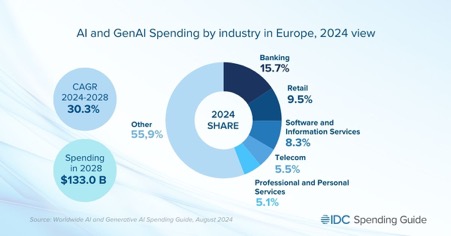European spending on artificial intelligence (AI) is projected to reach $133 billion by 2028, growing at a compound annual growth rate (CAGR) of 30.3% over the 2024–2028 forecast period, according to a forecast from IDC with the CAGR for GenAI is expected to be significantly higher at 55%
► GenAI expected to grow at 55% a year
► Overall growth for AI pegged at 30%
The latest figures come from IDC’s Worldwide AI and Generative AI Spending Guide. Software will be the largest category of AI spending, accounting for around 58% of overall investments. Initially, applications and platforms will generate the majority of this business, but by 2028, AI platforms will dominate, enabling end users to develop more customised solutions.

Services will be the second-largest and fastest-growing category, followed by hardware. The financial services sector is expected to lead in AI spending, with banking at the forefront, accounting for more than 23% of total AI investments. Other major spenders on AI will include retail and software/information services. Media and entertainment will be the fastest-growing sector, with a CAGR exceeding 33%, driven by the adoption of GenAI solutions for customer-centric use cases such as guided selling. Additionally, healthcare, life sciences, and retail will record above-average growth rates, with CAGRs exceeding 30% over the forecast period.

Security-related use cases, such as augmented fraud analysis and investigation and augmented threat intelligence and prevention, will attract significant investment, with 8.7% and 8.5% of AI spending in 2024, respectively. AI infrastructure provisioning and customer-focused areas, such as AI-enabled customer service and self-service, will be other areas of strong investment. Smaller but fast-growing customer-centric use cases include digital commerce and augmented professional growth and development, underscoring the emphasis on employee skills development. Augmented claims processing, particularly in the insurance sector, will also be a key focus area.
Read more of our latest Industry Updates news stories



